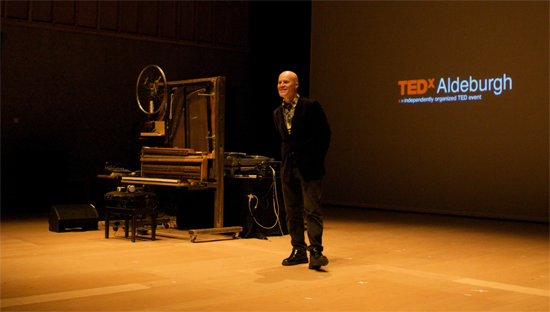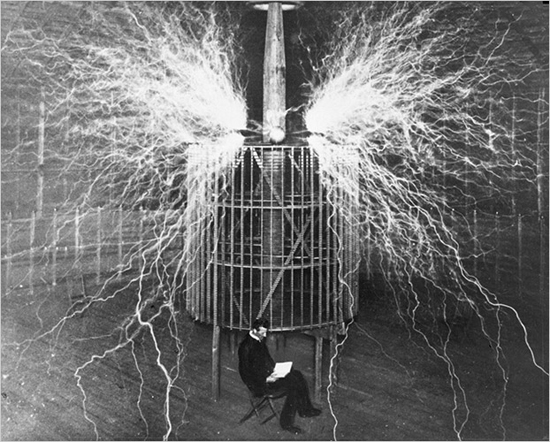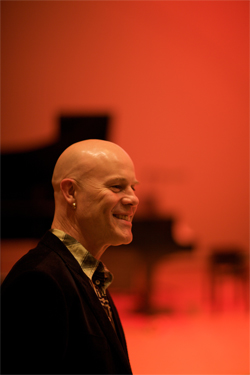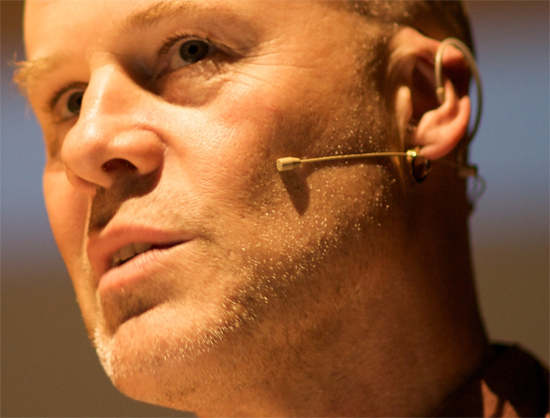I’ve heard there’s somebody on Facebook with a fan page called ‘Thomas Dolby has more than one good song.’ Indeed. He has a fair few good albums, and, after almost 20 years, a new album of original material coming out next year (it’s split into three EPs that impatient fan club members can get hold of early). He’s been up to a lot in the meantime, working in California on video games, cd-roms, virtual reality (remember?) and digital synthesizers–if you have a mobile phone with a polyphonic ringtone, guess who you can thank. These days he’s busy curating the music programme for TED (Technology, Entertainment Design), a series of conferences where crazy smart (or obnoxiously successful – sometimes it’s a fine line) scientists and creative types give 18-minute talks on their fields of expertise. The original TED events were invite-only, sort of like Davos or a less-evil Bilderberg summit, but available online to anyone who’s curious. They’re a good fit: both TED and Dolby are driven by a wildly inquisitive tech-geek sensibility that looks for fun ways to hack a dying planet.
When he’s not booking musicians for TED or working on any of his countless other projects, Thomas Dolby can be found recording in the Nutmeg of Consolation, his floating studio off the East Anglian coast. He talks to the Quietus about all these things, and floating cities, global disaster, naffness, and fungi that can save the world.
You’ve been curating the music programmes for TED and the TEDx Aldeburgh festival, and you often have some eclectic guests on your records (the new one features Mark Knopfler, Regina Spektor and Imogen Heap; past collaborators have included Robyn Hitchcock, George Clinton and Eddie Van Halen. A fuller list is on Wikipedia, and it’s fairly epic). I wanted to know how you choose people to work with.
Thomas Dolby: Well, from a personal point of view, I’m quite hard to please musically. There’s not many things I hear that I really like, but when I do, it just sort of clicks with me, even if I’ve never met the person and I have no idea of their background, it just sort of works for me. I ended up producing Prefab Sprout because I was a guest on Round Table on the BBC, and I was on a panel reviewing new singles, which were all absolutely dreadful, and the other guests were going, ‘Yeah, that’s great, love it!’ and I had to try not to be totally negative. Then this one song came on, and I’m thinking, ‘Wow, this is good, this is really good!’ and the other two reviewed it first and said, ‘Oh, well, I’m not sure if that’s going to be a hit really, it doesn’t sound like a hit to me’, and I waxed lyrical about this song and band, and they were up in Newcastle listening. After hearing me slag everybody else off, they were just hoping that I wasn’t going to be rude about their song, so they were very excited when I gave them a good review. They rang up about an hour later, and said, ‘Well, would you be interested in working with us, because we’re looking for a producer.’ So it just happens in all sorts of different ways.
And for the TED people specifically, how do you choose them?
TD: Well, TED is slightly different, because my role there is to find music that’s appropriate for that context. The main thing to understand is that given the barrage of intellectual stimulation that you get in the audience at TED, over the course of four days, the role of the music is almost to provide aspirin for people’s headaches, so, in general at TED, we don’t look for a musician who’s going to give a lecture as well. Some of them want to, but at the same time it has to be tasteful music, and somewhat eclectic. It’s not always easy to get a rock band on and off stage; it’s easier to do a singer-songwriter with an acoustic guitar. But that gets a bit old after a while as well, especially if they’re singing relationship songs and things that don’t fit so well with TED.

We sit down once a year with the TED team, and we talk about more iconic artists that we’d like to get a hold of. Increasingly as TED has become more successful, labels sort of see it as a valid promotional platform, like, ‘Let’s get Later with Jools Holland, and Morning Becomes Eclectic in the States, and let’s do TED.’ They see that as a good use of the artist’s time because of the quality of the audience, both the live audience and the audience of the TED talks online. They’re trendsetters, they’re early adopters, and it’s a very prestigious thing to do.
With your new album, A Map of the Floating City, you’re releasing it as three EPs and they’re all about specific places, but they’re all under the same umbrella of the floating city…is that idea sort of like the Nutmeg of Consolation, or the internet, or sort of a non-place place? What was your thinking when you made those divisions?
TD: I’ve had the album title in my head for ten years, and it represents several different things to me. There was a floating city in medieval Japan, when all of the merchants used to bring all their barges into Tokyo harbour, and there was gridlock, so they just rafted up. By day you could go there and trade for silk or spice or whatever, and by night it was a den of iniquity and it was outside the jurisdiction of the Tokyo authorities. Which I thought sounded like a good place to be. There have been some latter day examples, like the sea gypsies in the Phillipines, there’s actually a Muslim group who have a similar kind of culture, a raft culture.
But then the floating city represented to me also a sort of intensive reality in a more spiritual plane, like an invisible reality. And then when I set up shop in the Nutmeg to actually record the album, I’d be staring out over the sea, and the North Sea is pretty much always grey, but there’s a big container port near me, and so these massive container ships would come in and out, and in various states of the light you’d see a container ship sideways on and it looks like the Manhattan skyline. I started viewing this as an archipelago of little islands, with cities on them, and I sort of put that together with the Tokyo thing, and pictured this sort of future time, or alternative reality scenario, in which, after the climate crisis, there’s no oil left and nothing to put in the containers, but people start requisitioning ships and going out to the North Sea, and eventually they raft up, and there’s a land bridge to Europe.
As the songs started to emerge, there were clearly quite different styles to them. Some of them felt like a sort of farewell to America, where I lived for 20 years, and I had a lot of affection for it, for the roots American music, especially, which I knew nothing about before I went–still don’t know much about it, but i just got a sense of the traditions of storytelling and of music, the way musical styles had been brought over from Europe, and assimilated into something new. I think moving back here, it was really a kind of fond farewell to America, to have written some songs in that style. But I’m clearly an English guy, and I’m not going to do authentic bluegrass…[laughs]
I felt a very warm sense of homecoming, coming back to East Anglia, where my family are from. It really felt like getting back to my own roots, and so the songs that were a reaction to that are quite tranquil, quite dreamy, and certainly very different to the others. Then [the EP] Urbanoia is, you know, I’m not a city person. Given that where I live is so remote, so serene, when I come into a city, whether it’s London or New York or whatever, I get an initial little jolt of adrenaline, but it has a dark side as well. There’s parts of London I have to skirt around because I have bad memories of the times I lived there, so it’s like, ‘Ooh, can’t go to Wandsworth, I have to find a different way around.’
I don’t know how many of our readers are going to know about the Nutmeg of Consolation, so could you just describe about how you got it all set up?
TD: In California, we lived facing the Pacific, but we lived on top of a bluff. So there was no danger of being flooded. There was danger that there would be an earthquake and we would fall off the bluff, but not much danger of being flooded there. East Anglia, on the other hand, is pretty much doomed. There are little villages up and down our coast that are pretty much under the waves now, so it’s kind of only a matter of time, but things will get very exciting for a while before it just disappears forever.
You seem to have such hope for technology. You wrote this really nice blog about wind turbines that just popped up on the horizon, and how there were going to be failures, but there was also hope for the future. What do you see people doing with technology that can save us?
TD: Well, I mean, my point of view is this. If politicians and corporate CEOs are left to their own devices, we’re not going to solve this, it’s all going to end. So I mean, if there’s hope at all, it’s with scientists, and with the ability of scientific innovation to grab the public consciousness and change people’s behaviour. I think since the beginnings of science, that’s what happened, basically, somebody would invent something, sometimes out of necessity, sometimes for no reason at all other than they were just messing around in the lab and something fabulous just fell out. But it’s hard to predict when these things are going to happen, but when they do happen, and when they get adopted, you know, it changes the way culture is.
I really think that along with everything else accelerating, in the world, population growth and the rest of it, the rate of scientific growth and innovation is going to skyrocket over the next few decades. And it needs to, and I think more and more of it will be directed at survival. You never know what direction it’s going to come from. There was a guy at TED talking about mushrooms, as a way of cleaning up oil spills.
At TED in the summer, somebody, I think it was Chris Anderson [founder of Future Publishing and TED curator, not the Wired editor and Long Tail guy], asked for a show of hands as to who was in favour of nuclear energy as opposed to renewable energy. Surprisingly to me, initially, about 70% of the people were in favour of nuclear energy. And this wasn’t an ignorant vote. These were people who were well-informed, educated people, who had evaluated in their minds between the lesser of two evils, and in spite of everything they know, they were in favour of nuclear energy as being a viable solution. I wanted to stand up and say why it would take too long to solve our problems with renewable energy, and too much wastage, and too much footprint, and the carbon created to create the turbines was not justified by the yield that you got from them, and I just felt… the entry point for most new technologies, they don’t look all that promising. but things improve and improve, and eventually you reach a tipping point where it gets just good enough, enough adopters come in, that suddenly the cost gets cheaper. We’re just scratching the surface with renewable energy.
Plus, if more and more of the brain power in the world is focused on that area, which it hasn’t been, there will be breakthroughs that will be game changers. I don’t know if there will ever be a Moore’s law for renewable energy, but there will be something along those lines which is going to be a game changer.
Can I ask about retrofuturism and steampunk – you’re generally known as one of the forefathers of that. But thinking about technology being able to solve our problems, that steampunk/retrofuturist vision emerged as a culture in the late 70s, early 80s and it’s having a real renaissance right now. It seems to pop up at times when, politically, there’s a lot of ‘there is no alternative, this is how things are’, kind of talk about how technology is used, how the world is structured, how we use what we have. I’m wondering if you think maybe there’s a romance to it because it shows that at one time people were dreaming, and technologies could have developed another way…what do you think is the idea that drives retrofuturism, or causes it to flourish at certain times?
TD: For me the romance is definitely in the fact our imaginations are fired by new innovations, and in that initial sort of shock period where something new sparks your imagination but you don’t really know what it means. It’s kind of an opportunity for artists to go in and show the way. In my career that’s always been the way. Starting with electronics, you know, when they were quite rarefied, and then with MTV videos, with computer games and virtual reality and CD-roms and then the web, and then mobile and so on – these new gadgets, new techniques, machines or software arrive on the horizon, and it’s like people go, ‘Cool! What’s it for?’, and I kind of felt that it was always my role to go in and just when people were saying you could do a, b, or c with it, I can go in and say, ‘Ah, how ’bout d, how ’bout e?’ then they’d go, ‘Wow, I never thought of that!’
In hindsight, when you look back at similar watershed moments in history, there was this period where somebody, having sparked the public’s imagination, was able to be a conjurer and say, ‘Well, what about doing this with this?’ A great example was Nikola Tesla. There were already electric light bulbs, and they were starting to get places, but the economy of distributing electricity was not clear, and the Edison company needed to be within two miles of a power station, two miles to the electric lightbulb, using direct current. and when Tesla came along with this alternating current, which everyone pooh-pooed, he was doing things like saying, ‘Well, I’m going to take a boat up the Hudson, 26 miles, I’m going to wirelessly power something in Manhattan.’ Or, ‘I’m going to harness the power of Niagara Falls and use it to put electricity into a neighbourhood of the city 25 miles away.’ He did tricks with electricity at Madison Square Garden, with Tesla coils and electricity, and people were terrified of that.

They said to him, ‘What else have you got?’ and he said, ‘Well! I’m going to put a network of towers around the planet, and send electricity wirelessly so you won’t need to have an engine or a motor or anything, you’ll be able to draw electricity from the ether, like the way a tram draws power from a wire grid. In fact, you’ll be able to have airships and with no propulsion, other than they’ll be drawing their power from the air.’ And why not? If you’d seen what else he’d done, why not believe in the rest of it? So yes, there’s a romance in that, and yes there’s a fantastic romance in the fact that the establishment is going to shoot that down and call him a dreamer and a crank and all the rest of it. And that the Edison company is going to try and discredit him – and yes, they did demos where alternate current killed a dog or something, this poor dog was killed because he’d been exposed to alternating current, and it was a complete sham, they’d given the dog a tranquiliser. So I love the romance of all that, that kind of Tesla heroism, which is not the swashbuckling stuff but is fully informed by his knowledge, his imagination, his genius – I’m all over that.
One of the things that the Edison company was really notorious for is jumping all over other people’s patents, and stealing their copyrights. Now, you do a lot of work with people that requires collaboration, and you’re really good about supporting fans who do things in homage to your work. where do you stand on things like creative commons licensing?

TD: Yeah, I’m all in favour of it going forwards. I think that the way things were in the past–it’s not okay to say, well, all of that is over now, this is a game changer, now there’s no copyright because when I started making music, there was only one game in town. I wouldn’t have been able to function at all unless I did those deals with those companies. And every piece of plastic that they put out had a ‘do not copy this’ notice on it, but people copied it. So I don’t feel good about that, but the way things are going right now, I’m delighted with. I know now, that everything I do now, it won’t be hermetically sealed in a copyright box the way it used to be. I like the idea of collaborative work, and I like the idea of works evolving over time. There’s no single snapshot you can take of a song that has to live forever, because in reality songs evolve. The way I sing ‘Airwaves’ now is different than it was when I was nineteen. So what I like now is that I can put up a version of a song today and then if I write a new verse next month, I can put that up alongside it. The identity of the song is a continuum rather than just a release date, a street date where everything’s just focused on this big splurge.
As far as wanton collaboration and appropriation and elaboration of stuff, I have slightly mixed feelings about it, because, I’ll start out by saying I’m hard to please musically, right? If I was to do a remix contest, for example, the chances are that 99% of the stuff would be like delete, delete, delete. There might be a diamond in the coalface, but I really don’t like the idea of sifting through all that stuff. I did a remix of a Radiohead song, which was up on their website, because I loved the song, and I was interested to just go in and listen to the stems from it. But you know, there were a couple of thousand remixes on the site, and at least 99 percent of them were techno punk or eurotrash really badly done. And I can’t imagine the band got anything out of that at all. I mean, the satisfaction that 2000 people went to the site to download that and wanted to remix it, that’s great. But I don’t want to hear it, unless it’s good.
The concept of a wiki is really interesting to me because it raises the question of, well, if 99% of everything is crap, but democratically we have to arrive at a single point of focus, does the crowd have an ability to be its own editor, in the knowledge that most of it is bad, does it have the ability to have the cream rise to the surface? An example would be on my board, on my website. People like to do interpretations of songs. And people come up with some wacky ideas, ‘Ohhh, I always thought it meant this’. And they’ll take an enigmatic line, like ‘No it was nothing / some car backfiring’, and there’ll be a dozen different takes on what that meant to people. In the first instance, I love that I stimulated a response from them where if I’d actually filled in the answer, if they’d asked the question and I’d answered it, then it wouldn’t stimulate a response the same way. So I like that, and for that reason, I’m reluctant to…if someone asks ‘what does that line mean’ I’m reluctant to go in and answer it, because it kills it dead, people go, oh, that’s what he meant.
Keep ’em wondering
TD: Yeah, keep them wondering. But I’ve been toying with the idea – because there is kind of a mythology – a flow of mythology that carries into the new album. About a month or so ago, two people started doing a collaborative script, using characters from the songs. and it was quite out there, with some very interesting ideas. So I’m wondering what I can do to stimulate more of that, bring more people in, expand the audience for the new album by bringing people in who were too young to remember the music from the first time around, in many cases, but maybe their way into it would be through this collaborative fiction approach. I don’t know what it’s going to consist of, possibly a game, possibly a contest.
I’d like to ask your thoughts on naffness. You’ve collaborated with a lot of people based on some internal standard of your own, not necessarily what was the most cool and trendy at the time, and as a result of not limiting yourself that way you’ve produced some really interesting work. I mean, you do some great stuff with Mark Knopfler. And a lot of people are like, ‘Mark Knopfler? Dire Straits, eeugh.’ But c’mon! He’s an amazing guitarist, and you’ve worked with people all across the musical spectrum. Has naffness or being cool ever been something you’ve worried about? And with the way everything’s out there, and anyone can get any sound they want now, does the idea of cool or naff even exist anymore, or is it on its way out?
TD: I think it exists. When I left England in the 80s, it was really peaking, because the average journalist would say almost everything was naff, except this obscure Scottish indie band that I’m the only one that knows about, you know? And I’ve got a special pre-release cassette of theirs that you can’t hear.
But nothing can be that obscure anymore.
TD: Right. Right. You know I think the idea of naffness still exists, but things can turn around very quickly. There was a time when ABBA were naff, and there was a time when they were cool. And I think someone like Pet Shop Boys or Erasure were able to put them on the map. Again, at risk of appearing naff themselves in the process, you know, ‘You’re covering that song?’ Then six months later it’s cool, and now it’s no longer cool to cover an ABBA song because it’s passe. I’ve never been good at gauging my – if I set out to be cool, not naff, I’d be very bad at it, I’d make lots of bad calls. So I try and just look at the actual quality, to what extent something stimulates me and spurs me to do something. It either clicks with me or it doesn’t. And there’s just serendipity – some people just come along, just get on your radar, you just sort of bump into somebody and it feels right.


